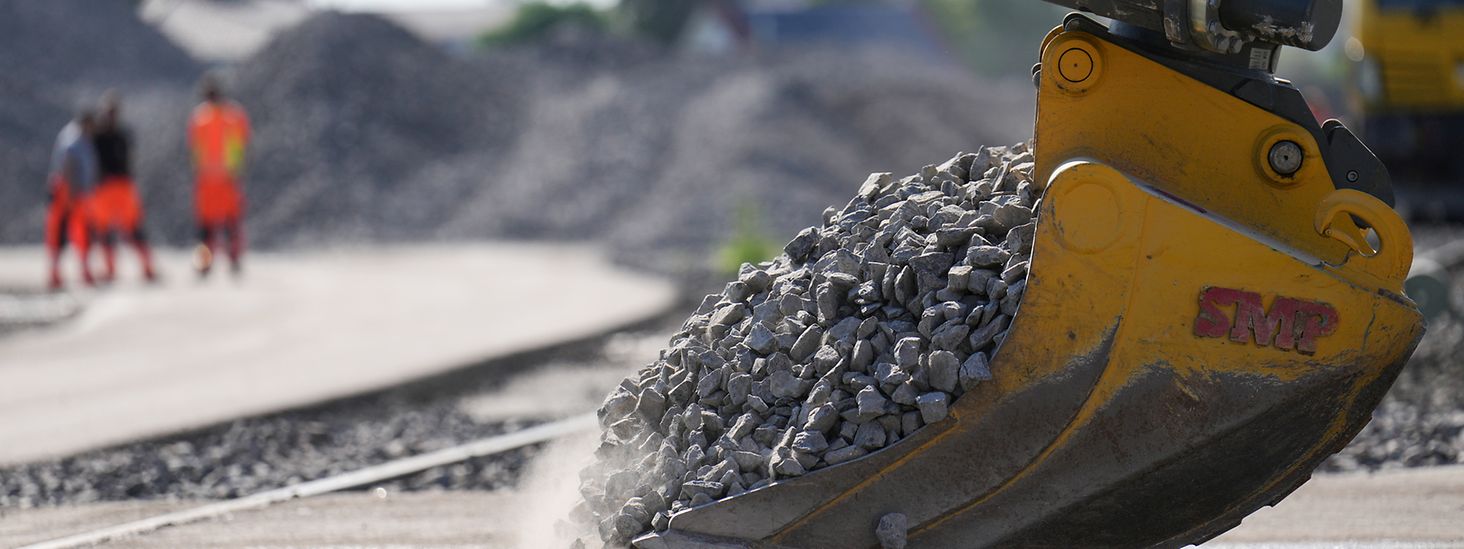In order to reduce emissions from increasing construction activity on the rail network, Deutsche Bahn intends to make greater use of low-emission building materials and other materials in the coming years. These are characterized by innovative, resource-saving production processes and the use of recycled materials. In this way, DB is contributing to its net-zero target and also laying the foundation for establishing a circular economy within the Group. To this end, Deutsche Bahn is also relying on strong partnerships such as the Future Railway Construction Initiative (ZIB).
In order to conserve primary resources and reduce emissions, DB is increasing the proportion of recycled materials in the building materials it uses – especially in the main resources of rail steel, track ballast, and concrete sleepers. At the same time, DB maintains a recycling rate of at least 95 percent for all waste. The recycling rate covers all DB waste, including construction waste, (electronic) scrap, municipal waste, paper, and waste oil.
Introduction of a circular economy
Deutsche Bahn aims to introduce a circular economy by 2040, subject to economic, legal, and technological conditions. To this end, DB is reviewing its value chain from procurement to operational use to disposal. Deutsche Bahn's goal is to use essential production resources and products, as well as the resources they contain, sparingly and to preserve them for as long as possible.
Efficient waste management
The construction and maintenance of rail infrastructure and the vehicle fleet in particular generate waste that contains valuable resources such as metals and mineral building materials. At DB, most of this waste is already recycled and thus remains available for reuse in the economic cycle.
With its internal waste management system, Deutsche Bahn also collects and disposes of almost every type of waste separately according to individual fractions. If materials and substances are no longer needed, they are checked to see whether they can be recycled and how they can be removed from the DB Group. This allows waste to be returned to the cycle and revenue to be generated for specific types of waste.
To promote the development of recycled and recyclable products, DB works in partnership with its suppliers. The Group is also active in various national and international associations and committees and is networked with various players on the topic of circular economy.
Erdpool
Deutsche Bahn is investing heavily in the renovation and new construction of its infrastructure. This generates large quantities of sand, gravel, clay, and natural stone as excavated material—for example, during the construction of tunnels. To ensure the sustainable recycling of these raw materials, DB relies on the Erdpool service. As part of the DB Bahnbau Group, Erdpool resells the material, thereby ensuring that the extraction of valuable mineral raw materials and the associated land consumption are reduced.
More information about Erdpool
Climate-friendly vehicles
Deutsche Bahn wants to reduce Scope 3 emissions caused by the production and use of rail vehicles and spare parts. To this end, DB is working to incentivize sustainable manufacturing and the use of low-emission materials in its procurement tenders – provided this is economically feasible.
With a view to the product life cycle, DB is already focusing on the use of spare parts that are as circular as possible in maintenance, on the integration of material cycles, and on maximizing the service life of vehicles. Among other things, 3D printing is used to produce specific spare parts and parts that are not available for train operations.
More information about the redesign of trains
Sustainable food service
DB offers many sustainable products on its long-distance trains and in its staff restaurants. Since March 2022, more than half of the meals served on board have been vegetarian or plant-based. And for many years now, food that has not been sold but is still edible has been donated to charitable food banks.
In addition, DB is switching to reusable packaging in its catering facilities in accordance with legal requirements. The company also uses resource-saving packaging that is 100 percent recyclable or compostable. This consistently reduces packaging waste and conserves valuable resources.

